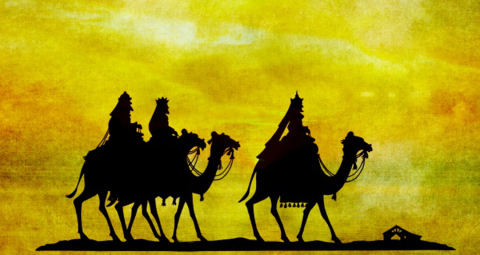January 3 | ![]() 0 COMMENTS
0 COMMENTS ![]() print
print

Discussing three modern ‘wise men’ in a largely secular world
Fr Jamie McMorrin takes a look at three modern ‘wise men’ searching for God in their big conversations of our secular world
You may recall a viral video from a few years back which imagined the Nativity Story as told by social media: the Holy Family made their way to Bethlehem with the help of Google Maps (calculated with a detour to avoid the Romans), Joseph booked the stable on Trip Advisor (no vacancies elsewhere) and the birth of the Holy Child was announced to the world on Facebook (where else?)
The Wise Men, meanwhile, discussed their plans on a Whatsapp groupchat and bought their famous gifts – with next day delivery – from Amazon.
If I’m honest, I can’t really imagine the Blessed Virgin Mary having much time to update social media: being the Mother of God and the Mother of the Church on top of that is, I can only imagine, a fairly all-consuming task.
Podcast
But if the three Magi were millenials, I’d bet my life that they’d have a podcast. Podcasts, audiobooks and Youtube videos are, to the internet generation, what bookshops, libraries and lecture halls were to generations past.
Anyone with an internet connection and an idea where to look, can participate in the most important debates of our time, in the company of the world’s greatest thinkers, at no cost whatsoever. Podcasts offer a forum for in-depth, long-form discussions, to which the twenty-second soundbites of TV and radio couldn’t ever do justice.
As I was travelling to visit some friends between Christmas and New Year, I passed the drive listening to a podcast featuring three – very modern – wise men. It was an almost two-hour discussion on the relevance of God in the modern world and featured Dave Rubin, a comedian and political commentator, John Lennox, professor of Mathematics at the Univeristy of Oxford, and Justin Brierly, an Evangelical radio host who, for the past ten years, has hosted ‘big conversations’ like this one on faith, science and what it means to be human.
Conversation
Rubin, in particular, is an interesting example of a ‘Magi’ for millenials. Jewish by birth, an atheist for most of his life, he is now searching for God in an intentional way. On his show, The Rubin Report, he interviews high-profile atheists and religious thinkers and says that he ‘approaches every conversation with absolutely no agenda other than finding out what this person thinks.’
Interestingly, his mind was changed on God by another high-profile internet phenomenon, the controversial psychology professor Jordan Peterson. Interviewed in the SCO by Richard Purden this time last year, Dr Peterson explores the archtypal psychological and moral truths of the Biblical stories, in this way encouraging many secular atheists–such as Rubin–to reconsider them in a new light.
In a world that is so bitterly polarised in so many ways, the podcast I mentioned was thoughtful, charitable and open-minded. The participants didn’t cut each other off, were happy to give the benefit of the doubt and seemed genuinely interested in learning something from the encounter. They certainly didn’t agree on every topic but all three of them were trying to reach the same ultimate destination: the truth.
Faith in God
For my own part, I think Peterson’s interpretations of the Scriptures are interesting but ultimately inadequate, and I would strongly disagree with many of Rubin’s moral positions and political opinions. Neither are Catholic. But, like so many people in our world, their search for the truth is bringing them very close to the threshold of faith in Jesus Christ.
Surely there are similarities here to the journey of the three wise men of the Gospels, in which we see a dialogue between faith and reason, Scripture and science, the People of God and the nations of the world. The original Magi were guided on their journey by their observations of the natural world and the light of their human reason, symbolised by the star; but they were informed also by their partially-understood reading of the Prophets of Israel, and by conversations with priests and religious experts who didn’t dismiss their quest but were willing to dialogue and, eventually, point the seekers towards Bethlehem.
I hope and pray that Peterson, Rubin and all those who are searching for the truth – whether online or elsewhere – will also find their way to Christ and his Church. The Magi were transformed by their encounter and returned to their own countries ‘by a different road’, surely, now, not as searchers but as zealous evangelists.
Evangelisation
Pope John Paul II famously said that the third millenium would see a new Evangelisation of our world: ‘new in methods, new in ardour, new in its expression.’ Surely God is already raising up new – and perhaps still unconverted – evangelists for our digital world. Peterson and Rubin could well be on their way to Bethlehem. Even Harris, Dennet and Dawkins, still breathing fire against the disciples of the Lord, might be charging their horses down the Damascus road.
They could yet turn out to be the Pauls, Augustines and Newmans of the New Evangelisation, the wise men of the third millenium who will put their considerable gifts at the service of the King of Kings. In the meantime, I’ll be listening carefully…










